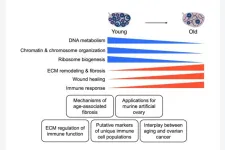(Press-News.org) An early phase in the process of developing Alzheimer’s disease is a metabolic increase in a part of the brain called the hippocampus, report researchers from Karolinska Institutet in a study published in Molecular Psychiatry. The discovery opens up for new potential methods of early intervention.
Alzheimer’s disease is the most common form of dementia and strikes about 20,000 people in Sweden every year. Researchers now show that a metabolic increase in the mitochondria, the cellular power plants, is an early indicator of the disease.
The teams behind the study used mice that developed Alzheimer’s disease pathology in a similar way to humans. The increase in metabolism in young mice was followed by synaptic changes caused by disruption to the cellular recycling system (a process known as autophagy), a finding that was awarded the Nobel Prize in Physiology or Medicine in 2016.
After a time, metabolism in the Alzheimer brain usually declines, which contributes to the degradation of synapses. This the researchers could also see in the older mice, which had had the disease for longer time.
“The disease starts to develop 20 years before the onset of symptoms, so it’s important to detect it early – especially given the retardant medicines that are starting to arrive,” says Per Nilsson, associate professor at the Department of Neurobiology, Care Sciences and Society, Karolinska Institutet. “Metabolic changes can be a diagnostic factor in this.”
Maria Ankarcrona, professor at the same department continues:
“Interestingly, changes in metabolism can be seen before any of the characteristic insoluble plaques have accumulated in the brain. The different energy balance tallies with what we’ve seen in images of the Alzheimer brain, but we’ve now detected these changes at an earlier stage.”
The study was conducted in close partnership between both researchers’ groups, who analysed the part of the mouse brain called the hippocampus, a structure that plays an important part in short-term memory and that is affected early in the pathological process.
Applying the technique of RNA sequencing to see which genes are active in the cells of the hippocampus during different stages of the disease, the researchers discovered that one of the early stages of the disease is an increase in mitochondrial metabolism.
The researchers studied the changes that then appeared in the synapses between the brain’s neurons using electron microscopy and other techniques, and found that vesicles called autophagosomes, whereby spent proteins are broken down and their components metabolised, had accumulated in the synapses, disrupting access to functioning proteins.
The researchers will now be studying the role of mitochondria and autophagy in the development of Alzheimer’s disease in more detail – for example, in mice whose disease provides an even better model of the Alzheimer brain.
“These findings highlight the importance of retaining functional mitochondria and normal protein metabolism,” says Dr Nilsson. “Going forward, we’ll be able to do tests on mice to see if new molecules that stabilise mitochondrial and autophagic function can retard the disease.”
The study was financed by grants from the Swedish Research Council, the Swedish Alzheimer’s Foundation and the Swedish Brain Fund and through private donations. The researchers have declared no conflicts of interest.
Publication: “Mitochondrial hypermetabolism precedes impaired autophagy and synaptic disorganization in App knock-in Alzheimer mouse models.” Luana Naia, Makoto Shimozawa, Erika Bereczki, Xidan Li, Jianping Liu, Richeng Jiang, Romain Giraud, Nuno Santos Leal, Catarina Moreira Pinho, Erik, Berger, Victoria Lim Falk, Giacomo Dentoni, Maria Ankarcrona, Per Nilsson. Molecular Psychiatry. doi:10.1038/s41380-023-02289-4
END
High metabolism is an early sign of Alzheimer’s disease
2023-11-01
ELSE PRESS RELEASES FROM THIS DATE:
Trust is the most important factor for British South Asians when taking part in genetic research to tailor medications
2023-11-01
Researchers from Queen Mary University of London have gathered detailed insights from the British South Asian community that could lead to more successful implementation of genetic testing to help tailor the use of routine medications. Their findings are published today (1 November 2023) in The Pharmacogenomics Journal and indicate key issues that could affect the take up of this new type of genetic testing amongst patients.
Despite comprising 10% of the British population, individuals of South Asian heritage have historically been under-represented in ...
Cigarette style warning labels could reduce people’s meat consumption
2023-11-01
Cigarette style graphic warning labels could reduce people’s meat consumption, according to new research published today (1 November).
The study suggests the use of warning labels on meat options could improve public health and reduce the UK’s carbon footprint.
The team from Durham University tested a range of warning labels including those which warn people of the damage to climate, health, and risk of pandemics. They found that all labels were effective at discouraging people from choosing meals with meat.
All warning labels, which showed ...
New research finds that nature-based solutions are essential for Brazil to meet its 2050 net zero pledge
2023-11-01
A new study has concluded that any credible net zero pathway for Brazil must include the implementation of nature-based solutions.
Actions such as halting deforestation and large-scale restoration of native vegetation would have immediate impact, at a fraction of the cost of carbon-negative technologies.
However, stronger policy frameworks will be needed if nature-based solutions are to achieve their full potential in Brazil.
Without the implementation of nature-based solutions, in particular ending deforestation and restoring ...
New position statement supports permanent standard time
2023-10-31
DARIEN, IL – An updated position statement from the American Academy of Sleep Medicine supports the replacement of daylight saving time with permanent standard time.
It is the position of the AASM that the United States should eliminate seasonal time changes in favor of permanent standard time, which aligns best with human circadian biology. According to the statement, evidence supports the distinct benefits of standard time for health and safety, while also underscoring the potential harms that result from seasonal time changes to and from daylight saving time.
“By causing the human body ...
Reverse engineering Jackson Pollock
2023-10-31
Can a machine be trained to paint like Jackson Pollock? More specifically, can 3D-printing harness the Pollock's distinctive techniques to quickly and accurately print complex shapes?
“I wanted to know, can one replicate Jackson Pollock, and reverse engineer what he did,” said L. Mahadevan, the Lola England de Valpine Professor of Applied Mathematics at the Harvard John A. Paulson School of Engineering and Applied Sciences (SEAS), and Professor of Organismic and Evolutionary Biology, and of Physics in the Faculty of Arts and Sciences (FAS).
Mahadevan and his team combined physics and machine learning to develop a new 3D-printing ...
Proteomic quantification of native and ECM-enriched mouse ovaries reveals an age-dependent fibro-inflammatory signature
2023-10-31
“Overall, our study provides novel insight into how reproductive aging impacts the murine ovarian proteome and ECM.”
BUFFALO, NY- October 31, 2023 – A new priority research paper was published on the cover of Aging (listed by MEDLINE/PubMed as "Aging (Albany NY)" and "Aging-US" by Web of Science) Volume 15, Issue 20, entitled, “Proteomic quantification of native and ECM-enriched mouse ovaries reveals an age-dependent fibro-inflammatory signature.”
The ovarian microenvironment becomes fibrotic and stiff with age, in part due to increased collagen and decreased hyaluronan. However, the extracellular matrix ...
Hix, Lajoie elected Fellows of the American Physical Society
2023-10-31
Physicists William Raphael “Raph” Hix of the Department of Energy’s Oak Ridge National Laboratory and John Lajoie, who will join ORNL on Nov. 6 from Iowa State University, have been elected Fellows of the American Physical Society.
The society works to advance and spread physics knowledge via research journals, scientific meetings, education, outreach, advocacy and international activities. It represents more than 50,000 members, including physicists in government, academia and industry worldwide.
Hix, leader of the Theoretical and Computational ...
Illinois Tech researchers receive award from peoples gas for solution optimizing efficiency of legacy steam radiators
2023-10-31
CHICAGO—October 31, 2023—Researchers at Illinois Institute of Technology (Illinois Tech) have been recognized by Peoples Gas with the Innovation Strategies and Technologies Award for their Battery-Operated Radiator Control (BORC) system, a groundbreaking solution to optimize the efficiency of manually operated radiators.
The researchers, Assistant Professor of Architectural Engineering Mohammad Heidarinejad and Arthur W. Hill Endowed Chair in Sustainability Brent Stephens, had the insight that traditional steam radiators are ...
Next-generation influenza B vaccines provide broad and long-lasting protection against flu viruses in preclinical tests
2023-10-31
Recent preclinical results indicate novel next-generation vaccine candidates developed at Cleveland Clinic protect against multiple strains of influenza and last longer than vaccines currently in use.
The vaccines are part of Cleveland Clinic's global vaccine research program, led by Ted Ross, PhD, Global Director of Vaccine Development at Cleveland Clinic. Published in Scientific Reports, the study credits the preclinical success of the influenza B vaccines to novel technology called Computationally Optimized Broadly Reactive ...
Digitizing books can spur demand for physical copies
2023-10-31
ITHACA, N.Y. – Book publishers cried foul – in the form of numerous legal challenges – nearly two decades ago when the Google Books project digitized and freely distributed more than 25 million works.
The publishers argued that free digital distribution undermines the market for physical books, but new research from Cornell University’s Imke Reimers and a collaborator reveals that the opposite – increased demand for physical books, through online discovery – could be true.
Reimers, an associate professor in the Charles H. Dyson School of Applied Economics and Management, and Abhishek Nagaraj, assistant professor ...






